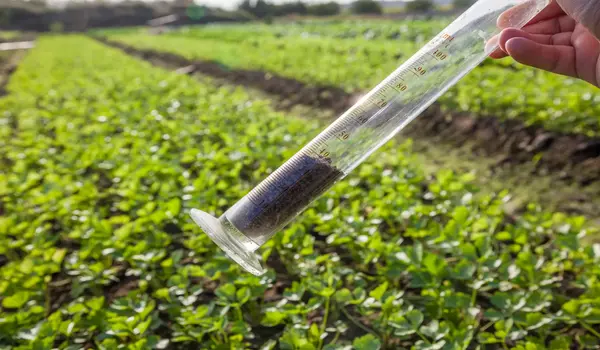Introduction Bulkagrochem is dedicated to advancing agricultural practices with innovative and sustainable solutions. As a leader in agricultural biotechnology, we offer expert guidance and products that empower farmers to optimize their soil management practices. Our focus on cutting-edge technology and research helps farmers achieve the best possible results by providing them with the tools and knowledge needed to enhance soil health and productivity. By integrating soil testing into their practices, farmers can make informed decisions that lead to more successful and sustainable farming outcomes. Benefits of Soil Testing Nutrient Management: Soil testing reveals the levels of essential nutrients in the soil, allowing farmers to tailor their fertilization strategies to meet specific crop needs. This targeted approach ensures that plants receive the right nutrients for optimal growth. pH Level Adjustment: Soil tests determine the pH level of the soil, which influences nutrient availability and plant health. By adjusting soil pH based on test results, farmers can improve nutrient uptake and enhance crop performance. Cost Efficiency: Accurate soil testing helps farmers avoid over-fertilization and unnecessary input costs. By applying only the required amount of fertilizers and amendments, farmers can reduce expenses and increase their return on investment. Improved Crop Yields: Understanding soil conditions and nutrient availability allows farmers to implement effective management practices that lead to healthier crops and higher yields. Enhanced Soil Health: Soil testing identifies issues such as nutrient deficiencies, imbalances, and soil degradation. Addressing these issues helps maintain and improve overall soil health, which supports long-term agricultural productivity. Environmental Protection: Proper soil management, guided by test results, minimizes the risk of nutrient runoff and environmental contamination. This promotes sustainable farming practices and reduces the impact on surrounding ecosystems. Disease and Pest Management: Soil tests can indicate conditions that may favor certain soil-borne diseases or pests. By addressing these issues proactively, farmers can reduce the risk of crop damage and improve plant health. Customized Soil Amendments: Based on test results, farmers can apply specific soil amendments that address deficiencies and improve soil structure, leading to better growing conditions and crop performance. Main Reasons for Soil Testing Understanding Soil Composition: Soil testing provides detailed information on the composition of soil, including levels of essential nutrients, organic matter, and texture. This information is crucial for determining the best management practices and amendments required for optimal crop growth. Optimizing Fertilizer Use: By analyzing soil nutrient levels, farmers can develop a targeted fertilization plan that meets the specific needs of their crops. This prevents over-application of fertilizers, reduces costs, and minimizes environmental impact. Adjusting Soil pH: Soil pH affects the availability of nutrients to plants. Testing allows farmers to identify and correct pH imbalances, ensuring that nutrients are accessible and enhancing plant health and productivity. Identifying Soil Issues: Soil tests can reveal problems such as nutrient deficiencies, excesses, or contamination. Addressing these issues helps prevent crop stress and promotes a healthy growing environment. Enhancing Soil Structure: Soil testing provides insights into soil texture and organic matter content. This information helps farmers improve soil structure, water retention, and aeration, leading to better crop growth and resilience. Conclusion Soil testing is an essential practice for farmers seeking to optimize their soil management and enhance crop production. At Unicrop Biochem, we emphasize the importance of soil testing as a foundational step in sustainable agriculture. By providing detailed insights into soil composition, nutrient levels, pH, and other critical factors, soil testing enables farmers to make informed decisions that improve crop yields, reduce costs, and support long-term soil health. Embracing soil testing not only leads to more efficient and effective farming practices but also contributes to environmental sustainability and overall farm success. Through careful analysis and targeted management, farmers can achieve a productive and thriving agricultural operation that meets both economic and ecological goals.
Bulkagrochem
Submit your contact number & get exciting offer
Bulkagrochem.com
Bulk Purchase & Get Bulk Discount
Share your number to receive customized bulk pricing, availability updates, and exclusive offers directly via WhatsApp.

Recommended Products



